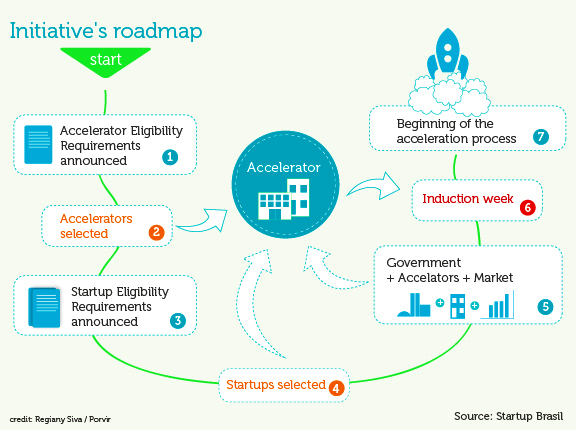Good news from South America: Brazilian and international entrepreneurs are being invited to apply for a national program of mentoring and investment that will distribute $20 million through 2014. In the program's first year, 100 companies will be selected. The Brazilian government expects that 25% of startups will be founded by international entrepreneurs who are based in Brazil. Companies will be eligible for up to $100,000 (R$ 200,000) in funding during their first year to support bringing a product to market during that time.
All areas of technology are welcome--but priority will be given to ideas that involve more than one discipline (such as health and technology, or education and health). Ministry representatives, including those from the Ministry of Science, Technology, and Innovation in Brazil, say that the government is particularly interested in education technology proposals.
“We want to be a hub that produces startups that are successful internationally. In this area of IT, competition is global and bringing outsiders here enriches the process,” says Rafael Moreira, coordinator of the program.

Applications for the program will be accepted through the end of March. If you’re interested, you can keep an eye on the program here.
According to Moreira, Brazil's program was inspired by a huge selection of international experiences, like Startup Chile and other similar initiatives from the US, Canada, and Israel. After studying those cases, they selected best practices and adapted them to the Brazilian reality and its incipient startup ecosystem.
The Brazilian government intends to start the program in June. Before that, though, there are seven steps. The first and second steps involve reviewing and selecting the accelerators that will be part of the process. Nine have been chosen and their names were announced in late February (check the steps in the graphic above; they're now on step 3).
Those organizations will work closely with the startups by mentoring, planning, managing, and financing their development. In return, the accelerators are benefit from the powerful spotlight that the government is putting on the program through extensive advertising in national media. That attention means the accelerators are likely to draw a higher caliber of entrepreneurs and projects than they might have previously been able to do. The accelerators will also be able to use government outposts--including a newly established Silicon Valley office.
This is good news for Brazilian startups that are already helping to warm the South American edtech market. Recently, startups Easyaula and Veduca received a generous funding – values were not disclosed – from Macmillan Digital Education. The first tool is a crowd-sourced learning platform where users can offer or attend courses. The latter is a website with 5,330 video lessons from the best universities in the world with legends in Portuguese. Besides these, a dozen new companies are also providing a foundation to this emerging ecosystem.
QMágico, which local media called "The Brazilian Khan Academy," now does much more than offer free video classes customized for Brazilian curriculum. In addition to classes that anyone can watch for free, they are also developing an adaptive platform that is being used by some public school systems.
Geekie, formed by young entrepreneurs who abandoned international careers in finance, is building an adaptive platform that promises to personalize learning. The team already has a product that prepares students for the Brazilian National Exam. Depending on what digital exam choices the students make, Geekie software is able to understand the specific parts of a discipline they have to focus on be accepted in university.
These entrepreneurs and more are finding their place in the sun, intrigued by the countless opportunities available in edtech. Brazil has more than 50 million students and 85% of them are in public systems and almost 100% of students ages 6 to 14 years old are in schools.


